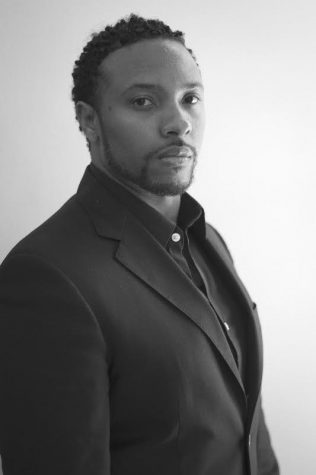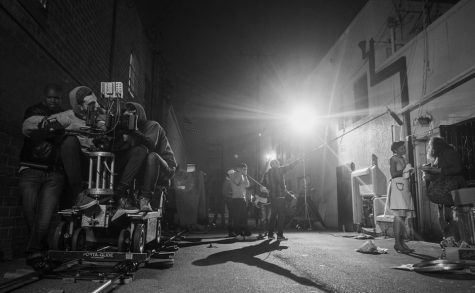The SMC film family takes "Cora" to Cannes
When Kevin Maxwell first told his grandmother he was going to make a film about her life, her first question was “how are you going to do that?” It was a fair question. At that time, Maxwell had never made a film, and had only recently left a full-time government job, working with the Transportation Security Agency.
“No one in my family has been involved in any film or anything of that nature," said Maxwell. "So to them it was foreign. It was a different world, and I was like, ‘You know what? I don't know how, but I'm gonna get your story out there.’ And I assured her of it.”
Maxwell made good on his word. Cora Maxwell’s story has now been made into a short film titled “Cora,” produced at Santa Monica College.
If that wasn’t enough, “Cora” was recently recognized by one of the most prestigious film festivals in the industry, the Cannes Film Festival, becoming the second film produced by the SMC Film Production program, known as Film 33, to be accepted into Cannes.
Cannes, the legendary cinema event which takes place annually on the south coast of France, is known for premiering Academy Award-recognized films like “Taxi Driver,” “Pulp Fiction,” and “Apocalypse Now.”
Fortunately, “Cora” won’t be competing with Francis Ford Coppola or the like for the Palme d’Or Award. Instead, it will compete in the Emerging Filmmakers Showcase at the American Pavillion against competing films from Chapman and NYU, two stalwarts of the showcase.
So how did Kevin Maxwell, a first time writer-director, get his film, produced on our humble stomping grounds, recognized by one of the biggest film festivals in the world?
Where most student films swap substance for style — showing their amateurism not in their technique, but in their lack of truth — “Cora” is a rich emotional tapestry. The story is a true one, and one at the core of its writer’s being.
It is a story set in Memphis, Tennessee in the mid-60s, centered around Maxwell’s grandmother Cora Maxwell, known only as Cora in the film. Cora is the owner of a restaurant called Cora’s Place and the breadwinner of her family. At work, she is terrorized by racially prejudiced police. At home, she is terrorized by an abusive husband. In the end, she makes a decision few others could make.
“Okay, how much time do I have?”
This is how Maxwell responds when asked why he chose to tell his grandmother’s story.
He speaks with passion and comfort when he tells the story of how he and his siblings ended up in the custody of his grandmother. It includes his mother succumbing to a serious medical condition, and the passing of his grandmother on his mother’s side only two months later.
“My grandmother, 60-something years old — we were going through this custody battle — so she comes in with this cast on her foot ‘cause she slipped and fell down with her home cleaning business — and she comes in with this cast, and she fights for us,” he said. “She fights for our custody, and she eventually gets custody of us and raises us. So she pretty much got me out of foster care. So as a child, I knew. I knew that I wanted to pay her back for something.”
Maxwell’s love and admiration for his grandmother is what brings every frame of his film to life. His desire to give her the recognition she deserves for everything she has done for him and his family is the very reason his internationally recognized film exists now.
“Imagine if you go through life, another 30 or 40 years, you're helping people, feeding people, making sure people are good financially, and you just go unnoticed,” he said. “That's what I didn't want to happen to my grandmother. I didn't want her deeds, and her support of others, and my father and family, and things like that to go unnoticed. So I wanted to give her a voice and allow that to speak on its own.”
The film resonates with people beyond the traditional reach of a student film, and it is not just because of Maxwell’s connection to his grandmother.
“It had great heart, and it was such a compelling story in terms of this woman who was dealing with domestic violence at home, and also what was going on in the political climate,” said Latarsha Rose, the actress who portrays Cora. Rose is known for her appearance in “The Hunger Games,” as well as her role in the TV show “Being Mary Jane.” “I think they're human issues, and I think over time we still have lessons to learn, and we learn them and then we forget them.”
“Cora” comes packed with social relevance, an obvious benefit to its film festival success, present and future. But to Maxwell, these issues are ultimately secondary.
“My goal wasn't to talk about racism, it wasn't to talk about domestic violence. It was really to capture my grandmother’s story and inspire other people through it,” he said. “And it just so happens that she was around those things at those times. She was around the racism, she was dealing with the domestic violence, and she had to fight for it.”
You can't detect any lack of interest in discussing the racism or domestic violence in Maxwell's film, because he is interested in them. But for the purposes of this film, he's interested in how they affect his grandmother. His passion for his grandmother's story is what drives the narrative of the film, as well as what drove the film to be made.
“Any project I work on, what really motivates me and galvanizes me is, it’s gotta have heart and it’s gotta be true,” said David Field, one of the producers of “Cora.” “[Kevin’s] grandmother was so important to him, and her story... was motivating him more and more. I heard the story about his grandma and, man, it’s just an unbelievable story — this true story of heartache and torment, but triumph, where she succeeds against all odds.”
Maxwell's passion was matched by Field, which then seemed to be matched by anyone else who was caught in the project's web.
“It's all about your passion, and how much you believe in your project, and how much work you’re willing to put into it, because you believe in what you have to say. And that was there from day one,” said head of the Film Production program Salvador Carrasco. “This project meant a lot for them... and you just felt they would do anything to make this happen.”
Cora’s story resonated with Field and Carrasco in the way it would continue to resonate with people throughout the film’s run, from the Film 33 class all the way to Cannes. However, before “Cora” could make it from point A to point B, it needed a little help from SMC, specifically from the Associated Students Board of Directors.
Two weeks before principal photography was set to kick off, a crowdfunding campaign that production was relying on to cover costs fell short of its goal.
“We just knew that this machine was already running and there was nothing we could do to stop it," said Maxwell. "We brought too many people together. We already had our cast, Latarsha, Joe Holt. We had all these people scheduled, so there was no way we could stop... We were just like, ‘Wow, what are we going to do?’"
During a production meeting not long after, another producer on the film, Juan Felipe Zuleta, approached Maxwell with the idea of approaching AS to complete their funding.
“Everytime I talk about it I get the chills,” said Field. “I saw people feel the energy. After we pitched for $5,000, one of the women on the board said, ‘Would you mind if we gave you $10,000?’”
While the rest of the AS board initially walked back that enthusiasm, granting only the proposed $5,000, the film came back to them later for another $5,000, which was approved as well.
“It was probably one of the most shocking moments of my life. I had never really seen anybody be that supportive. Everybody raised their hands. Everybody was wowed by the story, [and] the fact that it was my grandmother,” said Maxwell.
Despite the consistency of the support behind his film, Maxwell never stopped being surprised by it.
“I wasn't used to support like that, nobody pooling resources in to help me make something come to life. So it was really amazing how that happened,” he said. “But that's what made me stick to the script, if you will. To fight it out, and just move forward.”
Film 33 produces a short film every semester. The film is written, directed, and executed entirely by students, with only advisory from Carrasco.
“Cora” is one of six films produced by Film 33 in its brief history, and is the 2nd to be admitted to the Emerging Filmmakers Showcase following “Solidarity,” a short film written and directed by Dustin Brown which played at the festival in 2014.
With two of six completed films getting recognition from one of the most important festivals in the world, it is clear Film 33 has found a formula that works.
“I saw the growth from the students from the beginning to the end,” said Rose. “They got to see the working intensity of what happens on the fly.“
“What we have achieved in the film program here is to create a collective sense of ownership about the project," Carrasco said. "Sure, we talk a lot about Kevin, of course, because he wrote and directed it and there were David and other producers involved, but really the film was made by the 25 students in the class. And I do believe the great majority of them see the film as theirs. And the 25 students can use the film as their calling card, especially now with this great news about Cannes.”
This sort of attitude is reflected, perpetuated even, by the man at the helm of the project. When talking to Maxwell, it is almost impossible to get him to talk about himself. Regardless of the question, he has a tendency to start listing off names of people who made his film happen from executive producer Anne Spielberg, to the makeup artist, to the script supervisor. Maxwell has all of their names on the tip of his tongue at all times.
“I'm telling you, having a strong team is everything. Without them, I wouldn't have been able to do it,” said Maxwell.
Maxwell and Field both consider “Cora” to be their first major film credit, the director even going as far as to refer to it as his baby. While based on the results of their efforts they both clearly have a knack for filmmaking, they go out of their way to credit each other, their mentor Carrasco, the team they had behind them, and SMC.
"I have to give most of the credit to the team," said Maxwell. “These people...Santa Monica College as a whole really pushed me through these challenging times.”
Field said, “I owe so much to SMC. When they say it's a special place, it really is.”
For an artist who is equal parts humble and shy, Maxwell shows no fear of wearing his heart on his sleeve.
At the AS meeting on May 2, Maxwell and Field were approved $5,000 of funding to help them attend Cannes later this month. Upon receiving this news, Maxwell read an emotional thank you poem into a microphone to a Cayton Center packed with strangers — a bold act that would leave anyone vulnerable — and did it with confidence.
It’s this type of vulnerability that made “Cora” possible, and made it resonate with people in the way it does. In the time we talked, his mother’s medical crisis and the death of her mother were not the only hardships he shared.
“It's always tragedy that pushes you into taking action,” he said. “So an officer of mine, who was a colleague, a co-worker [at the TSA], a close friend... he dies in a motorcycle accident. I did the investigation, I looked into his bag, saw his blood all over his bag — it was crazy. Right after that, a few weeks later, I get a call about my grandmother, who had just had a stroke.”
It was during this time, with Cora in the hospital, that Kevin realized he had to tell her story.
“It was those moments that made me reevaluate everything," he said. "When I went in there to talk to her, she started to tell me these stories. I was on the side of the bed... I was editing a project, and I'm like, ‘Grandma, how did you get so strong?’... And it was her stories that really pushed me.”
About two weeks before he was due to start shooting “Cora,” tragedy struck Maxwell’s life again.
“I lost another colleague and co-worker in the line of duty. He got shot at TSA at the airport. I was devastated, seriously. This guy really supported me, and helped me try to figure it out,” he said.
After this tragedy, Maxwell was left reeling with little time to recover before the project that meant so much to him was set to launch.
Only days away from production, he was in a meeting with Carrasco and some other members of his team. He was having a particularly hard time coping that day, so he excused himself for a moment.
“I walked into a restroom just to scream, and get it out of me ‘cause I was hurting,” he said.
Later, Carrasco pulled him aside to ask him why he excused himself so suddenly. Maxwell was honest with him, and Carrasco met him with the advice he needed to hear. He told him that when he enters the world of his film, he has to leave behind everything else that is bothering him. He can’t let his life affect his work.
“The fact that he acknowledged it, the fact that he saw it, that he paid attention to what I did — it gave me this extra energy to keep going,” Maxwell said.
After hearing Carrasco's words, he felt he was able to compartmentalize.
“Everybody saw the surface of me, but nobody knew what I was battling inside,” he said.
In this moment, maybe even without knowing it, Maxwell gave himself the biggest compliment he ever could: he compared himself to his grandmother.
“But then, it also kept me reminding me about my grandmother too. It was the same thing. She was battling all of this stuff inside. She would go to work, nobody would know she was getting beat at home. She had to stay strong. She compartmentalized. And that's what I used to get through this whole journey ‘cause it was really difficult man. It was the support.”
Of course, with Kevin Maxwell and “Cora,” it was always about the support.
So how did a first time writer-director get his short film into Cannes?
If you ask him, he will obviously give the credit to someone or something else.
“Essentially everything you see in our film was some divine work man,” he said.
With the “Cora” crew just weeks from heading to Cannes, the idea of adapting the short into a feature-length-film hangs in the air.
Given that Kevin Maxwell is still a young man about to see his film at a festival for the first time, it may be fair for his grandmother to ask him, “How are you going to do that?”
With the passion he carries for her story, and the seemingly divine amount of support he attracts wherever he goes, it may be unwise for Cora, or any of us, to question him at this point.




